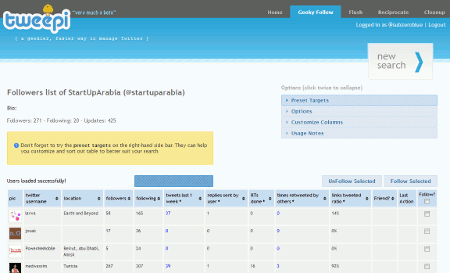 Tweepi is another project that has popped up from the Arab world to cater to the ever-growing group of Twitter users around the world, presenting a set of simple tools to help users manage their following and followers lists.
Tweepi is another project that has popped up from the Arab world to cater to the ever-growing group of Twitter users around the world, presenting a set of simple tools to help users manage their following and followers lists.
The site has started off with four different tools:
Geeky Follow: This tool helps you find users who share the same interests as you and whom you might be interested in following. The way it works is that it asks for the handle of a Twitter user that you like, and it goes and gets a list of people who follow that user too, with their details, so you can see who of them you’d like to follow too.
Geeky Flush: This is for the more sensitive Twitter users who don’t like it when they follow someone and they don’t follow them back. So this tool simply enables you to unfollow people who aren’t following you back.
Geeky Reciprocate: This is the flip side to the previous tool, allowing users to find users who are following them but that they’re not following back, so that they can start following them quickly.
Geeky Cleanup: This tool enables you to go through the list of users you are following to identify users you might want to unfollow, like spammers, inactive users or the likes.
The tools come with Preset Target filters that help you filter the list of users to better identify the users you want to follow or unfollow, depending on the tool. They also show you a number of different indicators for each user like how many tweets they’ve sent within the last week, how many RTs they’ve gotten, how many replies and RTs they’ve sent themselves, …etc. It’s possible to customize and choose which of these indicators are shown as columns in the result set.
The site uses oAuth to link with your Twitter account and be able to perform the different actions it needs to do following your choices on the system.
Tweepi was built by ThoughtPick from Jordan, and is still in its beta version.















